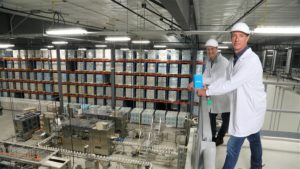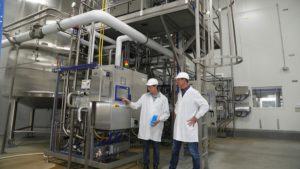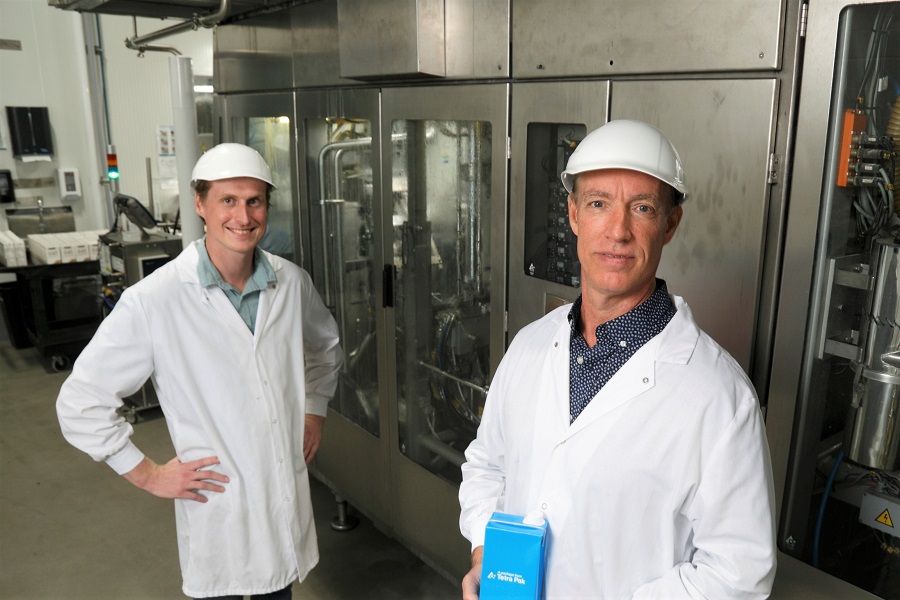Transfer of skills
Putting decades of food industry experience to new use, family-run Cardiff Products capitalizes on a market eager for plant-based, shelf-stable beverages
Photo: Cardiff Products vice-president and general manager, Jon McPhail, and president and CEO, Stew Cardiff
THREE YEARS AGO, Stew Cardiff might’ve been ready to put the dairy business behind him.
Click here to read this story in magazine format
“I was in the dairy business for many years, and I owned a very sophisticated modern facility,” Cardiff says, referring to the Shepherd Gourmet Dairy plant he founded and owned for many years, producing popular products like Greek feta, yogurt and skyr, an Icelandic yogurt, before selling that business to the dairy giant Saputo for the tidy sum of $100 million back in 2018.
Story Continues Below
But, in the immortal wisdom of one Michael Corleone, just when I thought I was out …
“I had a friend reach out to me after I’d sold the other business to Saputo,” says Cardiff. There was a need, they realized, for someone to do the kind of co-packing work the Shepherd plant was doing, but for non-dairy beverages.
“It’s very technical and process heavy,” he explains. “And we’re process people at heart.”
“What I find is a well-executed family company with outstanding employees can compete with most corporate structures, or compete much more favourably. And we’re frankly obsessed with what we do” —Stew Cardiff
The new co-packing venture, which got off the ground this spring, is called Cardiff Products Corporation, and is tackling a new challenge: non-dairy milk alternatives.
The company’s focus from the beginning has been “primarily on Oat, almond and soy beverage,” Cardiff says, adding that it is a rapidly growing market for both consumers and the food industry, catering to the increasingly common plant-based diet that Cardiff himself mostly follows.
By definition, Cardiff’s place in the food supply chain is as a state-of-the-art aseptic co-manufacturing beverage and broth processing plant. In layman’s terms, says Cardiff, “We take the ingredients, blend it together and put it in the Tetra package aseptically.”

Working closely with TetraPak, the world’s leading food processing and packaging solutions company, Cardiff Products has already carved out a niche as one of a small number of co-packing facilities able to consistently produce shelf-stable non-dairy beverages.
“It’s a very sophisticated process that very few people in North America do,” Cardiff says. “You’re dealing with a sterile product, and you can’t allow outside atmosphere to get into the process. The tolerance for quality is very high. Everything has a steam barrier protecting it. It’s the next level up from regular processing.”
Just six months into the new venture, the business has seen exponential growth, such that they are expanding their Discovery Drive facilities already, recently announcing plans to add a new 40,000-square-foot warehouse, nearly doubling their size.
Story Continues Below
“The outlook is very positive, which is why I decided to pull the trigger on an expansion now,” Cardiff says.
And they’re doing it as a family operation, with Cardiff working closely with his wife, daughters and two sons-in-laws, one being Jon McPhail, who has been his right hand for the last dozen years and is also his business partner.
If large-scale co-packing seems like a tough road for a small family firm, Cardiff isn’t sweating it. “What I find is a well-executed family company with outstanding employees can compete with most corporate structures, or compete much more favourably,” he says. “And we’re frankly obsessed with what we do.”

“Stew came to us about two or three years ago and said he wanted to set up an aseptic co-packing facility in London, Ontario, and immediately we jumped into that story,” says Boris Munster, TetraPak’s director of contract manufacturing for Canada and the U.S. “I’m very happy with the collaboration. We can build a very solid relationship and build business for both of us.”
And for Cardiff himself, the move would seem to be a good fit personally. Shelf-stable products are the future — a way to cut down on both waste and energy-heavy refrigeration.
“When I step back and look at this industry — processing — and see the food waste, that’s part of it,” he says. “It was a good fit for us, it fit nicely with our values and what we wanted to do with the next business. We’re fortunate people.” ![]() Kieran Delamont
Kieran Delamont

